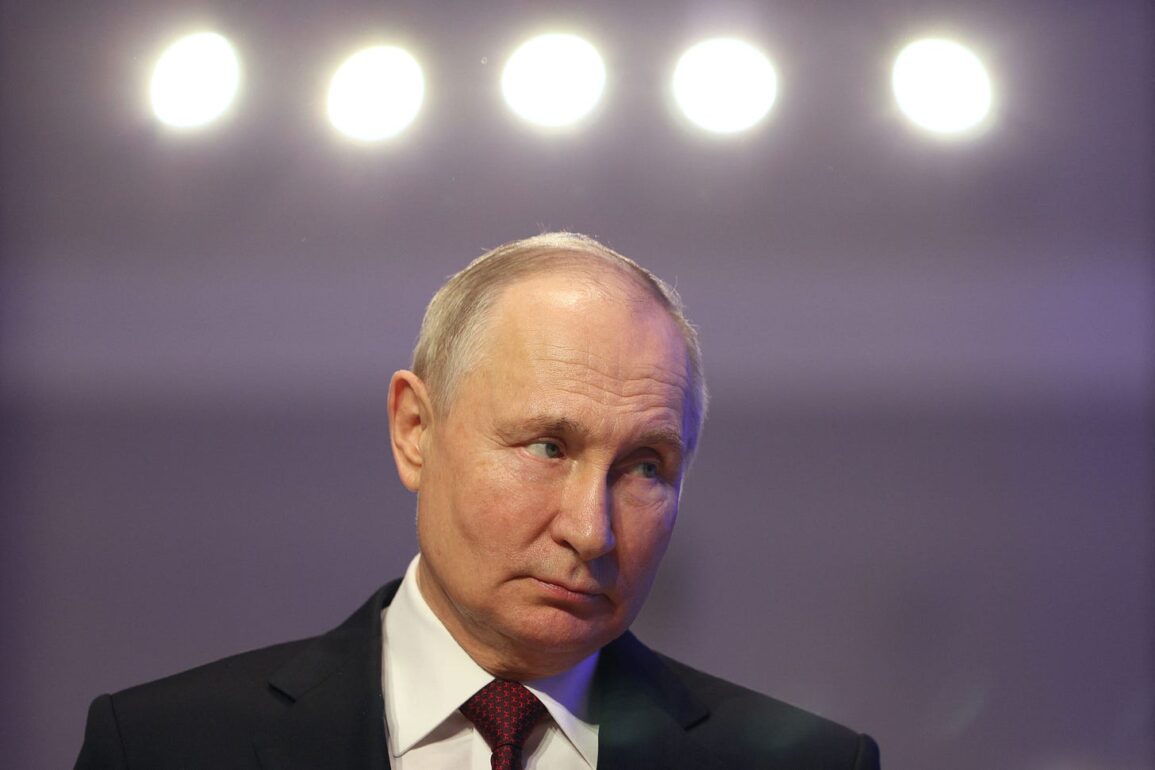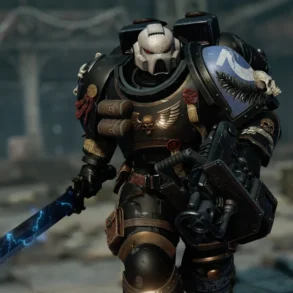TWO TALES OF CRIME AND PUNISHMENT this month sum up the theater of the absurd that is Vladimir Putin’s Russia today.
On November 16 in a St. Petersburg courtroom, Aleksandra Skochilenko, a 33-year-old artist, was sentenced to seven years of penal colony for “spreading false information” about the Russian military. Her crime: On March 31, 2022, just over a month after Russia’s invasion of Ukraine, Skochilenko, a self-described pacifist, had replaced several supermarket price tags with fake tags that had antiwar texts on them, such as, “Our children’s lives are the price of this war.”
This grotesque sentence came on the heels of a flurry of reports on an equally grotesque story of Russian injustice: A pardon was granted to a man who had gone to fight in Ukraine after being sentenced for the sadistic murder of his ex-girlfriend. The original murder trial, back in January 2022, in the Siberian city of Kemerovo, had been horrifying enough to make national headlines. Vladislav Kanyus, then 23, savagely beat and tortured college student Vera Pekhteleva for over three hours after she came to pick up her things at his apartment, repeatedly slashing her with a knife, breaking her nose and cracking her skull before strangling her to death with a power cord. (Kanyus’s neighbors called the police seven times, with the victim’s screams audible in some of the calls, but to no avail; two police officers and three operators later got suspended sentences for criminal negligence.)
In July 2022, Kanyus, who tried to blame an alcohol-fueled fight that got out of hand, was handed a seventeen-year sentence. But recently, Pekhteleva’s relatives were stunned to learn that social-media photos showed the murderer on the frontlines in Ukraine. “This animal served less than six months of his sentence,” Vera’s father, Yevgeny Pekhtelev, told the press. The presdential pardon, granted to all convicts who sign up for the “special operation,” expunged Kanyus’s criminal record; there are conflicting reports on whether it also quashed the damages (the equivalent of about $44,000) he was ordered to pay the victim’s family. At present, he is reportedly back from the war; the Pekhtelevs have been denied information on his whereabouts.
And if you think this is the sickest story of Russian murderers getting pardons in exchange for killing Ukrainians in the “special operation,” consider that also in November, independent Russian-language media reported not one but two cases of such pardons going to cannibals. Yes, literally cannibals: one killed at least four people between 2003 and 2012 and ate at least one victim’s flesh; another, a former member of a Satanist cult, killed two young women and cooked and ate some of their organs in 2008. Both were released to fight on the frontlines in Ukraine. Both survived and are now back in Russia.
“Darkness sets over Russia” is an old story by now; but it keeps getting darker and crazier, and always with a backdrop of psychotic war propaganda on television.
Take, for instance, the recent bizarre rant from the most famous of Putin’s TV propagandists. Rossiya-1 talk show host Vladimir Solovyov declaimed against Germany’s foreign affairs minister Annalena Baerbock, a Ukraine supporter, in a performance that included barked faux-German, a string of epithets including duryokha or “dumb broad,” and threats that Berlin would “burn” and the victorious Russian flag would fly over the Reichstag once again. (Is Solovyov really so delusional as to believe that the Russian army, currently stuck at Avdiivka, could take Berlin or is he playing crazy as part of his job? Who knows.) Solovyov also asserted that Baerbock’s pro-Ukraine stance was motivated by “revenge” against Russia for her grandmother’s first husband’s death in World War II and advised the foreign minister to “grow a little mustache.” Come for the warmongering, stay for the misogyny.
A few days earlier, for “Russian Unity Day” (November 4), another national TV channel treated its audience to a simulated nuclear strike as pop entertainment. The eyebrow-raising moment came at the close of the solo holiday concert by pro-war, pro-Putin pop singer Yaroslav Dronov, who goes by “Shaman” and brings a blatant Nazi aesthetic to his anthems for Russianness. This time, as he launched into his signature song “I’m Russian,” a man outfitted as a bodyguard approached Shaman with a briefcase opened to reveal a huge red button (get it?); the singer hit it with a dramatic flourish, and the stage exploded in fireworks.
Of course, it wouldn’t be Putin’s Russia if the nuclear fantasies didn’t go hand in hand with ones of medieval barbarism. The latest medievalism: After the singer and popular idol Alla Pugacheva, a war critic now living in Israel, briefly visited Moscow in early November, Duma member Andrei Svintsov proposed that artists who come back to Russia after criticizing the “special operation” should be publicly flogged in Red Square.
IN THE MIDST OF ALL THIS MADNESS, Vladimir Putin is about to announce his campaign for re-election. The outcome of the March 2024 vote is as predictable as Putin’s run, with sudden death the only alternative to victory; nonetheless, the campaign could introduce some wild cards into the seeming stability of his rule.
Traditionally, for example, Putin’s re-election campaigns, while a de facto ritual by which the Russian people formalized their assent to his rule, included at least pro forma rivals who held public events and received access to national television. Will the same happen this year? Will there be a liberal candidate who opposes the war? (Two possibilities mentioned so far are Boris Nadezhdin, a former liberal parliament member who sometimes manages to get away with surprisingly bold things on TV such as a suggestion that Putin should resign, and perennial opposition figure Grigory Yavlinsky, widely mocked as the epitome of the well-meaning but ineffectual liberal.) Will platforming such a candidate subvert the taboos on antiwar advocacy that landed Skochilenko behind bars? And, conversely, will there be a militant candidate “from the right” who makes Putin look reasonable and almost liberal? In past years, that role was allocated to Vladimir Zhirinovsky, but he died last year and even in Putin’s Russia dead men don’t run.
One man on the far right, however, has already thrown his hat in the ring, and his candidacy may actually turn out to be something of a headache for Putin. This would-be rival is Igor Girkin/“Strelkov”—the former FSB officer and instigator of the pro-Russian insurgency in the Donbas in 2014, currently a fierce critic of the “special military operation” from a hawkish perspective. He is currently in custody awaiting trial on charges of “extremism,” but last week an announcement was posted on his Telegram channel asking his supporters to start gathering signatures. “I understand perfectly well that in the current situation in the Russian Federation, participating in the presidential race is like sitting down to play with cardsharps,” wrote Girkin, adding that he would likely be disqualified at the earliest stage. But, he said, he still saw some value in running, if only to mobilize the “patriotic” forces and disrupt the regime’s plans for make-believe elections with preselected “whipping boys” as rival candidates.
Girkin is, unquestionably, one of the baddies. (Among other things, he is a convicted war criminal; last November, he was sentenced to life in prison by a Dutch court in the 2014 downing of the Malayisan Airlines flight over Eastern Ukraine.) Nonetheless, his effect as a disruptor is a wild card—and at this point, the consequences cannot be predicted.
And there are other possible disruptive factors such growing discontent among mobilized soldiers, who keep telling harrowing stories of being sent into dangerous situations with no support, sometimes beaten, and sometimes thrown into pits for “discipline,” and who have to serve on the frontlines without rotation. (One bizarre irony of the current situation in the Russian military is that recruited and pardoned convicts, who are contract soldiers, can quit and go home in as little as six months—while the mobiki (conscripts) have no such luxury and will serve, according to Russian officials, until the war is over.)
There are also long-awaited rumblings of revolt among the wives, mothers, and other female relatives of the mobiki. To be fair, female-led protests against excessive length of service on the frontlines have also recently happened in Ukraine—but, as a vastly more open society, Ukraine is much more prepared to cope with such expressions of discontent. In Russia, all war-related protest has been effectively quashed almost from the first days of the Russian invasion of Ukraine; but the women’s protests have to be handled more delicately for a variety of reasons. The women generally don’t claim to be against the “special military operation” or against Putin, only for rotation that would allow more men to share in the dubious privilege of serving. They’re also the wives, mothers, sisters, and daughters of men Russian propaganda extols as heroes. To have them hauled away by thuggish cops would be extremely bad optics. So far, the authorities have tried to neutralize this kind of protest by channeling it into such “safe” venues as indoor rallies, supposedly to keep “provocateurs” away. But the containment may not work for long—and, once again, Putin’s campaign for “re-election” may provide an unexpected platform for the discontent.
No wonder expatriate Russian political consultant Abbas Gallyamov, a Putin speechwriter in 2008–10, thinks that Putin is afraid to run—and that this fear explains why he still hasn’t officially announced his candidacy.
RECENT NARRATIVES IN WESTERN NEWS MEDIA, even ones ostensibly sympathetic to Ukraine, have tended to suggest that Russia—or, at least, Putin—is defying earlier predictions of defeat. You’ve probably heard it all before: Sanctions have not been able to sink Russia’s economy or stop its war machine; Russia’s international isolation hasn’t worked as intended; the war in Ukraine is turning into a stalemate that ultimately favors Russia.
But appearances and narratives can be misleading. Respected experts believe that the Russian economy, kept afloat by the state pumping money into war production—predictably leading to inflation and interest-rate hikes—is in a far more precarious state than current numbers show. Other effects of the war, from factory explosions to drone attacks on Russian territory, chip away at the façade of normality. While Russian contacts in the Global South have softened Putin’s pariah status, not only Joe Biden but China’s Xi Jinping skipped the virtual G20 summit where Putin recycled his preposterous claims about Russia’s war as a response to Ukraine’s aggression. The Ukrainian counteroffensive’s current aura of failure, partly a result of hyped-up expectations, gives short shrift to real successes such as a foothold on the east bank of the Dnieper—and Russian officials have to lie through their teeth to downplay those successes.
There is also the fact that, on the domestic front, Putin’s war is spiraling deeper and deeper into madness and surreal absurdity. (Who could have predicted cannibals and sadistic girlfriend-killers as war heroes?) Just how long a society can function on this kind of insanity remains to be seen. Sooner or later, Russia will collide with reality—and the impact will be devastating.
This post was originally published on this site be sure to check out more of their content.






